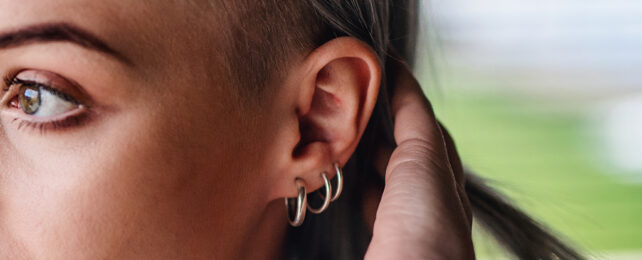You may not have ever realized it, but there are many trillions of microorganisms living on our skin – and puncturing the skin and inserting a metal object, also known as getting a piercing, creates a significant shift in that microbiome.
A team from McGill University in Canada, in partnership with a local tattoo parlor, collected skin swabs from 28 volunteers who were getting ear piercings. The swabbing began before the piercing, and samples were collected for the next two weeks.
The researchers wanted to take a closer look at how this sudden change in the microbiome environment – potentially shifting everything from the shape of the skin to its temperature – would affect the lives of the microorganisms living nearby.
From the perspective of the bacteria, eukaryotes, and other microscopic critters that call the skin home, a piercing is a cataclysmic, apocalyptic event – like a giant earthquake or a meteor strike – and that was borne out in the microbiome analysis.
"We found that, over time, the new piercing environment was significantly associated with greater biodiversity and ecological complexity, with fundamental differences in the nature of biotic interactions compared to exposed earlobe skin," write the researchers in their published paper.
As the team notes, the piercing process starts with the sterilization of the skin, effectively clearing the 'ground' of microbes and providing a new space for a new microbial community to move into.
After that, a greater biodiversity and ecological complexity was observed. In terms of microbiota, these areas began to match other moist patches of skin more closely, like those you would find in the armpit or the nose.
The Staphylococcus epidermidis and Cutibacterium acnes bacterias were found to be particularly prevalent around piercings. They're both potentially dangerous, but when they exist together in the same spot, they tend to keep each other in balance.
Of course, skin piercing is nothing new: it's been going on for thousands of years. However, this is the first time that scientists have been able to look closely at what the consequences might be for the tiniest lifeforms on the skin surface.
As with many other places on and in our bodies, the skin microbiome needs to stay carefully balanced to keep us healthy. Studying piercings and their consequences could help us learn more about how to keep that balance in place.
"We know from anthropology and sociology that piercings are uniquely human symbols of expression, connection, and identity," says biologist Charles Xu, from McGill University.
"With this study, we've shown that skin piercings also represent an unintentional act of ecosystem self-engineering of the ecological landscape that is the human skin."
The research has been published in Proceedings of the Royal Society B: Biological Sciences.
